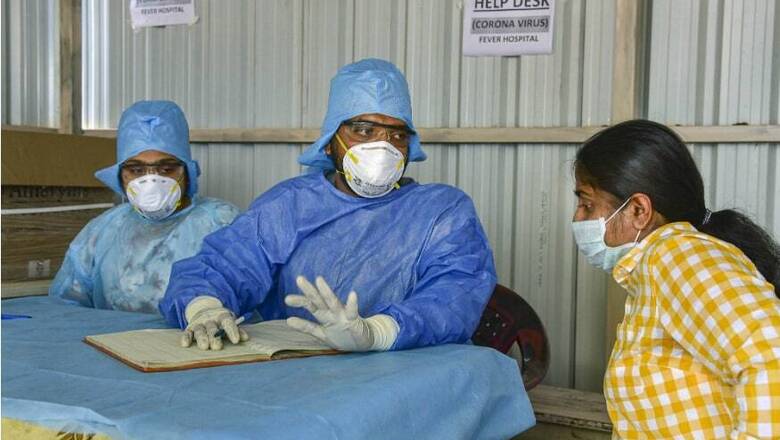
views
New Delhi: Between January 30 and March 16, 110 people in India have tested positive for COVID-19, the infectious disease caused by the SARS-CoV-2 virus. These 110 were found positive from over 6,800 tests that were carried out ever beginning end of January. But what is the protocol for testing people, where are these tests being done, who is being tested and what is the strategy helping containment of the virus? We try to answer these questions in the following explainer on testing for SARS-CoV-2 and COVID-19.
What is India's testing protocol?
If you have a cold, cough or fever and don't have a history of travel to countries that are high-risk at the moment or have not come in contact with travellers, chances are that you will not be tested immediately for coronavirus. As opposed to South Korea, which is testing as many as 12,000 people per day.
India is currently following a highly restricted testing protocol.
As per the Indian Council of Medical Research (ICMR), the country's apex body on biomedical research, anyone with history of travel to high-risk countries such as China, Hong Kong, Japan, South Korea, Singapore, Iran and Italy and those who have come in contact with a person who has already tested positive will get tested. This also includes all those who have been or will be evacuated from these countries or from cruise ships.
Even among those who have returned from high-risk countries, only those who have developed symptoms such as dry cough, cold and fever during home quarantine are being tested. State and district surveillance units under health departments of each state are tasked with keeping a tab on symptoms of those who are in home quarantine or under observation. If a person develops symptoms and gets in touch with government helplines, they are to be provided an ambulance to visit the nearest hospital designated where samples are collected and isolation wards have been prepared.
Why is India not testing those without travel history?
According to officials from Ministry of Health and Family Welfare and ICMR, most cases in India can be categorised as imported cases, referring to the foreign source of the virus while some cases have been categorised as local transmission. These are the persons who tested positive after coming in contact with a relative or friend who returned from abroad. “There are three stages of the disease. Stage I is seen through imported cases and in Stage II there is local transmission. We are not worried up till Stage 2. In Stage III, we will see community transmission and in Stage IV it becomes an epidemic,” Dr.Balram Bhargava, Director General, ICMR said.
In community transmission, a large community or area is affected and it is difficult to trace the original source of the transmission.
Nivedita Gupta, ICMR scientist, epidemiology and communicable diseases division, said, “We want to avoid indiscriminate testing. We have to rationalise it somewhere.” ICMR scientists have also said that early testing of asymptomatic people may throw of “false negative” results.
“When a person is asymptomatic their viral load is not going to be very high in the beginning. If you give a negative report at that point of time it gives a sense of false security. They can develop disease within 14 days during the incubation period. That is why we are restricting ourselves to only symptomatic ones. The other reason is that ones you have tested symptomatic persons, the whole system goes into contact tracing mode to trace and put them into home quarantine. At the end of the day the onus is also on people to be in quarantine after they return,” said Dr. Lalit Dar, Professor, Department of Microbiology, All India Institute of Medical Sciences, Delhi.
Are we testing to check for community transmission at all?
Yes. ICMR has started testing random samples of influenza-like illnesses and pneumonia-like illnesses of those without travel history. Between February 15 and February 29, the Indian Council of Medical Research (ICMR) tested 150 samples, Nivedita Gupta said. This was done at 13 labs in February to see if there was community transmission. However, none of the samples tested positive. This sampling will be scaled up from March 15 and it will happen every week across more virus research and diagnostic labs of ICMR.
Where are we testing samples and what is the testing capacity?
There is a network of public health laboratories under the Department of Health Research and ICMR. Under this network, India has 106 virus research and diagnostic labs (VRDLs). Detection of viral pathogens using serological methods and molecular diagnostic tools is the major focus of VRDLs.
Between mid to end of February, only about 20 labs were functional for testing to COVID-19 cases. The National Institute of Virology, Pune, was largely handling the load of confirming the tests and other labs did the first round of tests. Now, 51 labs can test COVID-19 samples along with National Centre for Disease Control. Of the 51, 31 can test the first samples as well as do the confirmatory second round of test. In addition, 57 VRDLs and 1 facility at Leh have facilitate sample collection through government health authorities, transport of samples to nearest testing labs and they also provide collection material (swabs etc.), as per ICMR.
As per ICMR, each of these 51 labs can handle between 90-100 samples per day. However, the government labs are not facing a high testing load as of now and there is a good reserve capacity in government lans, as per ICMR scientists. “As of now, not more than 60-70 samples per day are being received across 51 labs,” said ICMR scientist Nivedita Gupta.
Prior to the testing, nose and throat swabs are collected from the person suspected to be infected by the virus.
Where are we obtaining testing kits from?
ICMR and NIV are not using commercial testing kits. As per ICMR, India is not currently dependent on external sources for procuring the chemicals or reagents that are used in the lab tests for detecting the virus in test samples. The testing kits have components that have been custom synthesized locally.
Some of the testing components are being procured from Germany, ICMR scientist Dr. Raman Gangakhedkar said.

















Comments
0 comment